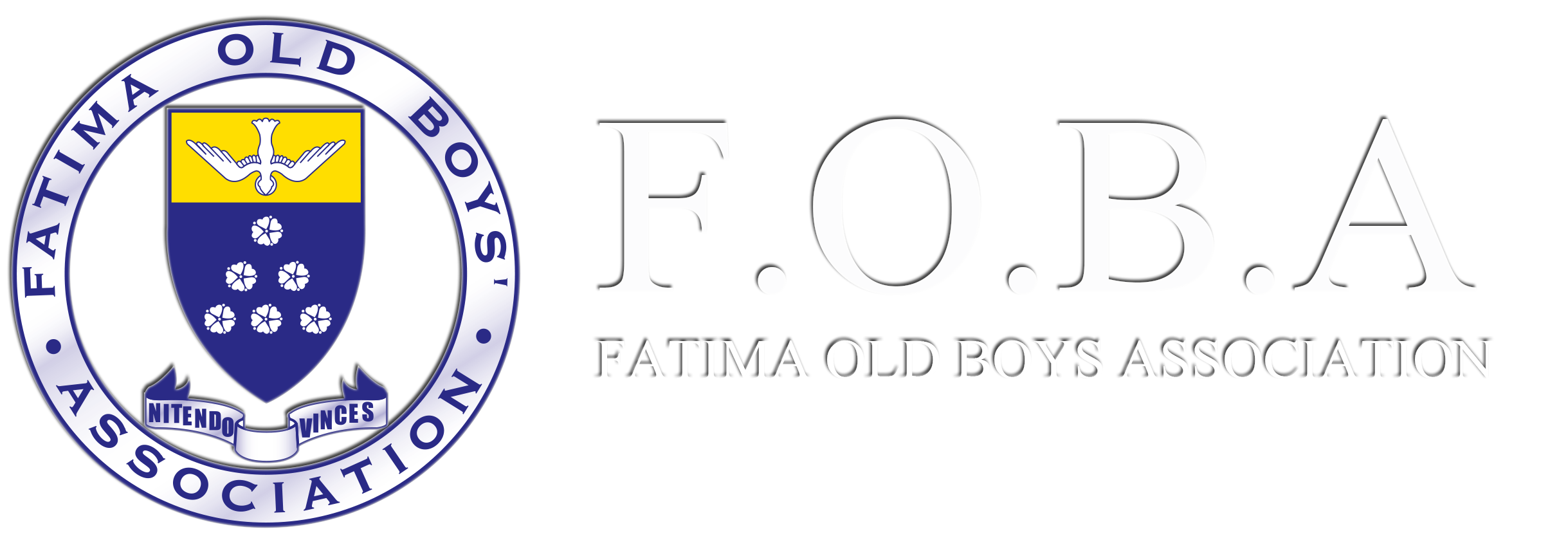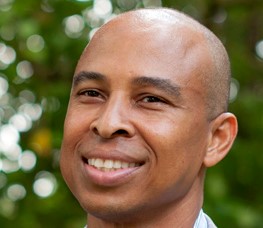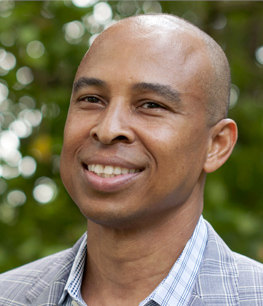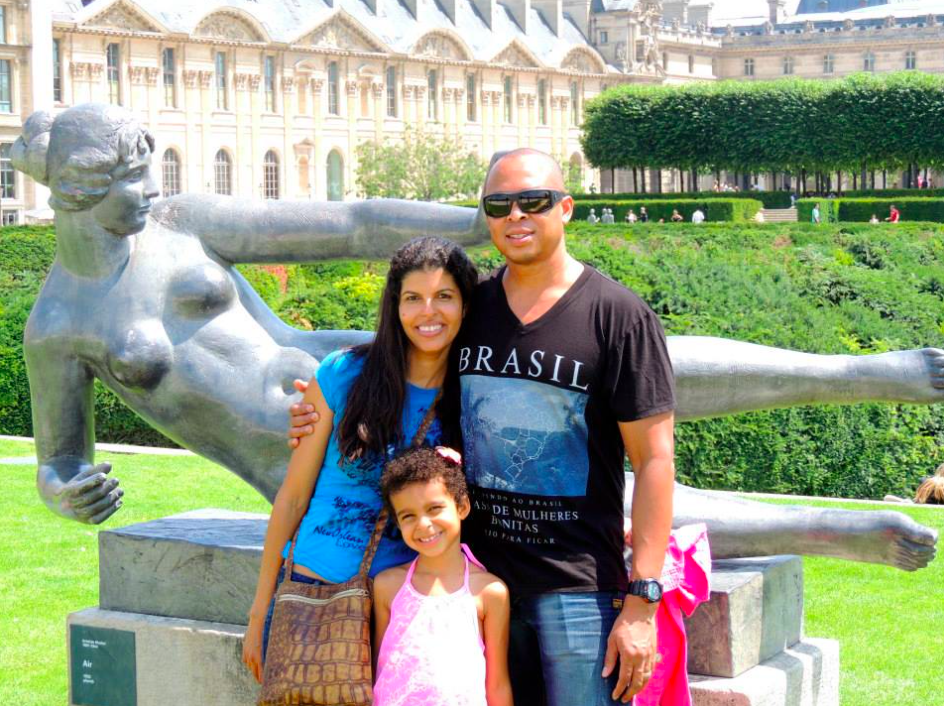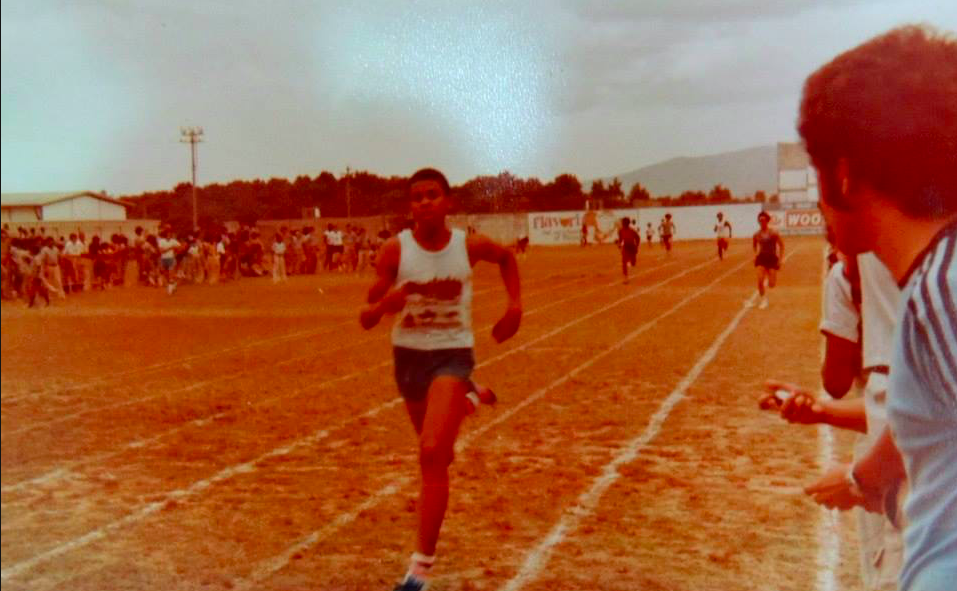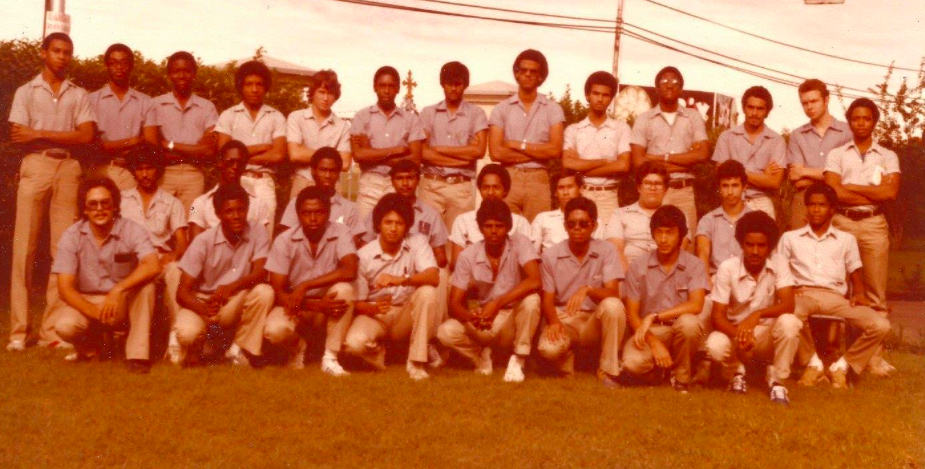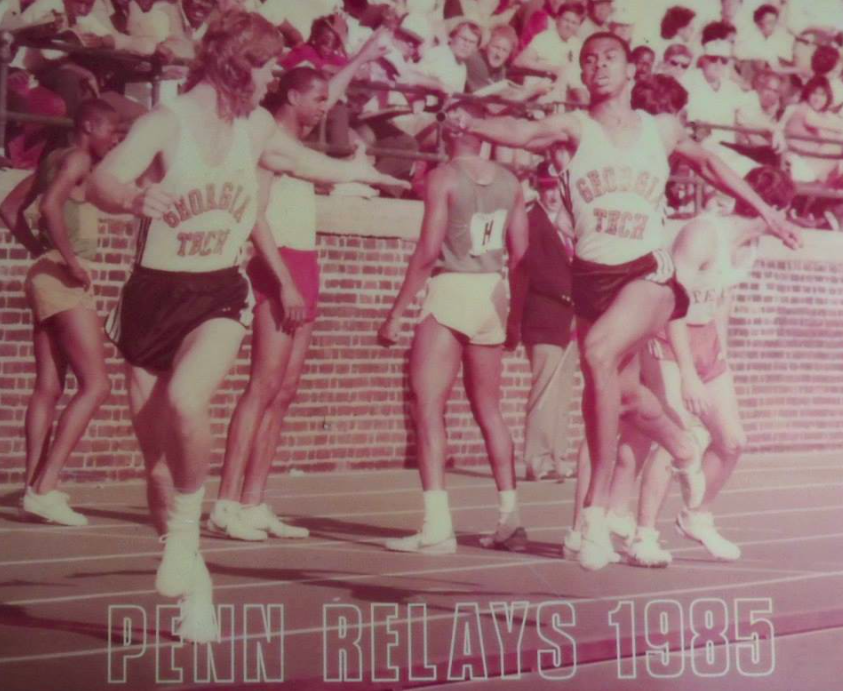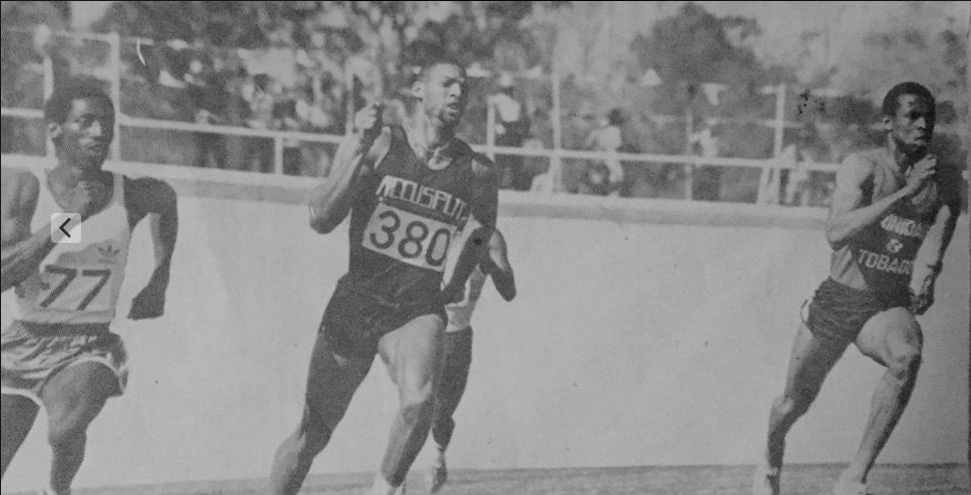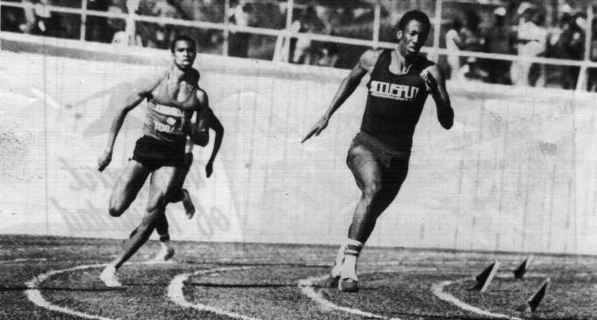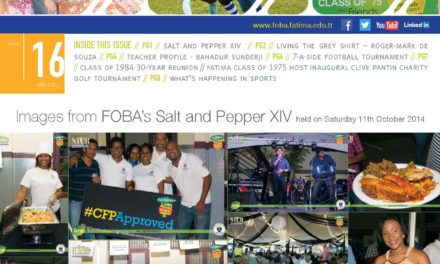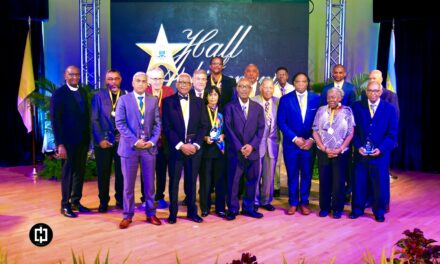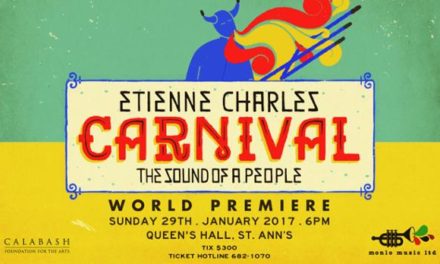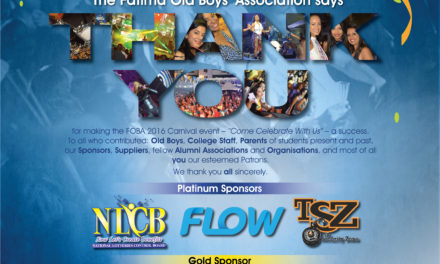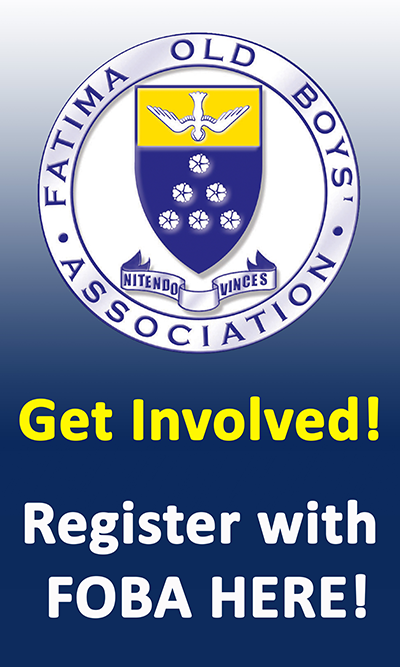- Views 4371
- Likes
Carlyle with wife Susanne and daughter Julia in Paris
1979 Fatima Sports’ Day – 400m
1982 Form 6 Class Picture (Carlyle far left standing)
1985 Penn Relays 4x400m
1985 Tesoro Games 400m – Ian Morris, Mark Rowe (US), Carlyle Bernard
1985 Tesoro Games 400m – Carlyle Bernard, Michael Paul
Interviewer: Raymond Samms
Some say he could sprint from Arima to Mucurapo… which in a nutshell exemplifies what was natural to Carlyle Bernard (Fatima years 1975-1982)—striving for excellence in accomplishing the unexpected.
At Fatima, Carlyle acquitted himself so well academically and athletically in the classroom and on the field, that he won the Trophy for Best All- Round Student-Athlete in 1979. And he earned a track scholarship to study Civil Engineering at the Georgia Institute of Technology.
With the pedigree of his father, the late Police Commissioner Jules Bernard, a Fatima Alumnus himself, Carlyle continues on track, in his professional life as a Consulting Advisor.
Q: Your sister Janice is a former Olympian (4×100 metres relay at the 1984 Summer Olympics) and your elder brother was also an elite athlete. Was there a sibling rivalry? Who was the most talented of all three?
A: Janice Bernard was a national teammate of mine but we are not related.
My sister Hilary (1 year my senior) however was a very accomplished athlete and inspiration. She was the 1979 NAAA National Champion in the 400 m while still 16. She represented Trinidad & Tobago in the 1978 Commonwealth Games, the 1980 and 1982 Junior Carifta Games, and the 1982 Senior Central American & Caribbean Games. She attended New York Institute of Technology on a track scholarship, then the University of North Carolina for Dental School. She also played field hockey at Holy Name Convent. My elder brother Jules (2 years my senior), though talented did not pursue track as seriously as we did, but was very supportive.
Q: You have 20+ years experience in domestic and international oil and gas consulting. What’s your take on the future of the oil and gas industry in Trinidad?
A: In the 1970s Trinidad displayed unbridled courage and entrepreneurship by investing in the liquefaction of natural gas when it was not popular. That led to global commodity production leadership in LNG, methanol, and urea. We have not since capitalized on that head start to truly transform Trinidad & Tobago into a first world country. We became comfortable instead of further investing in other machinations of the hydrocarbon molecule and leveraging our relatively cheap industrial feedstock. I think we’ve lost an opportunity by not advancing past the raw commodities play. We could have invested in the technical capability and talent needed to fuel the next level of industrial maturity – the mass production of sub-assemblies then finished goods. For example, those of us who can afford it have an appetite for German and Japanese automobiles, we enjoy strong trading relationships with those countries, yet we have not sought to manufacture metal, rubber, or plastic car parts for the likes of BMW, Audi, Lexus, Toyota.
Q: What influenced your choice of Fatima College for Secondary School?
A: Both my father Jules II (former Police Commissioner) and my brother Jules III attended Fatima. With my brother 2 years ahead of me while at Fatima I was well prepared and protected. I remember Father Brett warning me that he had taught my father and expected the same and more from me.
Q: At what age did you start running?
A: I started competing for the Arima Abilene Athletics Club in 1975 or 1976 after witnessing Hasely Crawford battling against the likes of our own club’s Charlie Joseph, and the American sprint greats Steve Williams and Steve Riddick. I remember receiving an autograph from Hasely in 1975 – that’s when the I truly got stung by the track bug. That being said, my brother Jules, sister Hilary and I were always the fastest kids in our neighbourhood for as long as I could remember.
Q: Describe the culture of the school in your time?
A: Fatima was very vibrant. Many of the hallmark teachers like Mr. Holman, Mr. Brash, Mr. Joseph, Mr. Ramdass, Mr. Achilles, Mr. Garcia, Ms. Yorke, Ms. Zakour, etc were all very young, energetic and very driven to be excellent teachers and role models that they eventually became. From a sports perspective Fatima in those days was all about cricket and football so much so that I had to beg our sports masters Mr. Leeha and Mr. Romero for donations for a singlet and shorts to represent Fatima at the first Secondary Schools Sport Championships in 1979, whilst our football team was being outfitted with Umbra kits.
Q: What are your best and worst memories when you think of your Fatima years? What other thoughts come to mind?
A: My best memories of Fatima include growing up with a group of very smart, creative, funny and talented young men as we all navigated through the perils, uncertainties, and discoveries of adolescence. Memories span intellectual joists in levity, victories during Sports’ Day, playing pick-up football games and wind-ball cricket matches on the school grounds, or listening to the wistful sounds of pan tuning or practice from the Phase II pan yard in the late afternoon, while doing homework and waiting for our father to come pick us up.
I cannot recall any bad memories.
Q: What was the biggest piece of mischief you got up to during your years here?
A: You must be mistaking me for my older brother. I was a model student but may have been guilty once or twice by association.
Q: Which teacher positively impacted your school experience and life the most and which one did you give the most trouble?
A: Mr. Holman, Mr. Garcia, and Mr. Achilles immediately come to mind. Mr. Holman boasted that no student ever scored 100 in his Spanish tests – I took the challenge seriously and proved him wrong. Mr. Garcia’s energy and love for Math and Physics has led so many Fatima alums to top engineering programs such as MIT and Georgia Tech, that his impact speaks for itself. Mr. Achilles helped me overcome my initial mental block for Algebra and Add. Maths and transformed it into a GCE O’Levels A grades in Math and Add. Maths.
Q: What house were you in for Sports’ Day and how many times did they win?
A: I represented Archbishop’s House. My classmates were Anton Corneal (football) and Sheldon Edghill (track cycling). With Sheldon and me in the same house we cornered the points for both cycling, track and the field events so we were usually victorious.
Q: How did Fatima influence your athletic career?
A: Though most of my tutelage in the sport came from the coaches at Arima’s Abilene Athletics Club, Mr. Lee Ha was always very, very supportive. Excelling at Sports’ Day, setting school records only served to further bolster my confidence
Q: Did you participate in any other sports while at Fatima or Georgia Tech?
A: No. Track at a high level is very time consuming. Once I knew I was above average and started representing Trinidad in age-group athletics, the risks of a bouncer to the head in cricket, or a painful kick to the shins in football sent me into early retirement as far as those sports are concerned.
Q: If all your teachers were still there, who would you check first on visiting Fatima today, and which classmates would you get together for a lime?
A: Mr. Garcia had the good sense to move to the Borough of Arima so I sometimes see him at the market when I visit home. One of my classmates was Mr. Ramdass’s younger brother so invariably when I get together with old classmates in Trinidad I do run into him.
Q: What is the most valuable lesson that you learned at Fatima? What is one thing you would you have done differently with the benefit of age and maturity?
A: Confidence. My brother, sister and I grew up in Arima, which in those days was perceived as the East or the Bush. That alone inspired us all to represent our proud town well. I confess I was intimidated on my first day at school but when I placed first in class all the way through Form 1, Form 2, then top three in Form 3, followed by a very strong showing at the GCE O’Levels, I felt vindicated.
I followed the math and science track because it was the thing to do. I however was even stronger in languages, History and Geography given the prize-giving medals I still retain. I often wonder if I pursued those subjects whether I would have been a teacher, sociologist, lawyer or diplomat today.
Q: While at Georgia Tech, you continued to set an example as an exceptional student-athlete. How did you balance athletic training with studies?
A: I was well prepared for Georgia Tech. Though I left Fatima on a full athletic scholarship after the first term of Upper Sixth Form I had already had most of the Calculus, Physics, and Chemistry required of the first 1-2 years of an American engineering curriculum. That facilitated an easier transition to the social, cultural, and sports regimen travails. In addition my mother was a school principal so not a week went by without her calling to find out my latest test grades, so though I was abroad I was well grounded. Whatever else I struggled with in Atlanta, GA I could always pick up the phone and call my older sister in New York at New York Tech, or my brother at the University of Southern California in Los Angeles. Given our close age range we were all at university simultaneously.
Q: Did you ever consider doing athletics professionally?
A: No. In my day professional track was in its infancy with Carl Lewis of the U.S. challenging the global governing bodies to relent to that model. In addition, I had put off everything else for track from the age of 12 to 22. With an freshly-minted engineering degree, weary legs from 4 years of indoor and outdoor competition I took a break. As it occurred I then ended up securing a job with Schlumberger Drilling Services working on offshore oil platforms. That spelled the end of any further, serious pursuits in the sport.
Q: Bachelors’ degree in Civil Engineering > Masters of Science degree > Consulting Advisor and President of St. Martin Consulting LLC based in Florida. Tell us about your company and your career goals.
A: My graduate degree in Operations Research and Operations Management led me to Boston, MA and the start of a career in management consulting. My area of study is the source of what today has become Lean Six Sigma, Supply Chain Management, etc. I have been fortunate to leverage my industry knowledge in oil & gas, my exposure to strategy consulting, my expertise in operations improvement, and project management into a consultancy that has allowed me to work in 15-20 different industries. One of my memorable projects was at NBC Studios at Rockefeller Center in New York. My client was the VP of Broadcasting and Network Operations. I remember riding up the side-entrance elevator daily with the likes of Tom Brokaw, Conan O’Brien, Al Roker, and a sleuth of talk-show guests including Serena and Venus Williams. My career goals are to delve more into the areas of Data Analytics and Prescriptive Analytics, the latest wave of corporate performance differentiation
Q: Most of your career’s highlights seem to be in Management. Do Engineering and Management go perfectly hand in hand?
A: Engineers while sometimes creative are taught to think or design solutions within a construct or context. Management however forces one to be more visionary, to think out-of-the-box, to come up with fresh ideas, insights, approaches, and opportunities that lead to step changes and market leadership. Very few folks can formulate a symbiotic relationship between the two, but if so you definitely have the opportunity to stand apart.
Q: Do you prefer fieldwork or office work?
A: I do both. You have to walk the floors, be out in the field to truly understand the realities and challenges of executing a strategy via prescribed operational procedures. The on-the-ground intelligence provides you with insights and refinements for continuous improvement
Q: What are your thoughts on the privatization of T&T’s major energy companies such as Petrotrin and the National Gas Company?
A: For a relatively small country it is always difficult to see flagship corporations pried away from the very stakeholders who own and are served by them as citizens. Sadly, only a small percent of our population actually enjoy the spoils of our natural resources. As citizens we also have not done ourselves any favours. Corporate greed, unqualified leadership, poor decision making, unreasonable union demands have forced most of these state agencies toward privatization in hope of recouped efficiencies. Unless astute management is employed however, nothing’s going to get any better.
Q: With the continued decline of our Hydrocarbon Reserves and the imminent boom just south of our borders, do you think that Guyana may play a major role in the future longevity of our energy industry?
A: This all depends on the strength of regional partnership, trust, and political will. Guyana has a long way to go before recouping its first dollar from discoveries. It is up to them to capitalize on Trinidad & Tobago’s longstanding expertise to deliver services in lifecycle recovery, production, collection, processing, transportation, and monetizing.
Q: You were a member of the inaugural batch of individuals inducted into the Fatima College Hall of Achievement. What did receiving this award mean to you?
A: It was a very privileged moment for me, especially with my deceased father Jules Bernard being honoured post-humously. My sister accepted on his behalf but my mother Gloria who has been instrumental in both our lives definitely felt very blessed to be there.
Q: Please introduce us to your family.
A: My wife’s name is Susanne. My daughter Julia is 9 years old
Q: Any athletic genes in your children (if you have any)?
A: My daughter inherited my freakishly long legs so we’ll see if she exhibits a liking for the sport; she is built for the 400m hurdles. My brother Jules’s son (Jules Bernard IV) just committed to a full scholarship in basketball at UCLA. At age 17, as a 6’ 8” shooting guard he is already a member of the U.S. Under-20 national team in that sport. I look forward to seeing him in action next year.
Q: Tell us about your typical day? What do you do for leisure?
A: I am typically away from home at a client site working anywhere from the boardroom to the work sites. In the boardroom I work with executives and data to derive insights, develop strategies and opportunities for business improvement and profits. I then transition to manufacturing plants, refineries, offshore installations, etc to execute those strategies in the form of projects which may take the form of technology applications, implemtnation of tools, processes, management systems, or managerial coaching.
For leisure I am still an avid track fan and keep up with the news daily. In between projects I get back to a local track to conduct interval speed workouts.
Q: What do you see as the biggest challenge for the young boys of this era and what can Fatima do to support this?
A: Invariably many Fatima students will become the next leaders of our country’s private and public sector, whether by talent, inheritance, or networked relationships. As such it is incumbent on the teaching staff to invest in curricular or extra-curricular development in entrepreneurship, public speaking and civic leadership. Their stewardship will impact the lives of many fellow citizens so they have to nurtured from a young age on what is defined as accountability, responsibility, and humanity.
Q: Your athletic accolades read as follows: setting a Regional U-17 400m record; picking up Gold, Silver and Bronze medals in the 400m, 800m, and 4 x 400m relay at the 1979/1980 National Secondary Champioships; 1980/1981 Junior CARIFTA Games; and 1980 Junior CAC Games; Gold at the 1983 Junior CARIFTA Games (U-20 400m and 4 x 400m relay); 4th place at the 1983 Senior Pan American Games (4x400m relay); NCAA Div. 1 All-American (4 x 400m relay); and Silver in the 1986 Senior CAC Games (4 x 400m relay). Is there any triumph that means the most to you? Any missed opportunity that haunts you to this day?
A: The 1984 NAAA National Championship 4x400m final featured the perennial champions – the Trinidad & Tobago Defence Force. I received the anchor baton in 3rd place about 30-40m down. To date I do not know how I caught not just any anchor, but Olympian Michael Puckerin at the line for the victory. A few timed my split unofficially anywhere from 44.5 to 45 low. Another was Georgia Tech’s College Division 4x400m relay victory before a raucous Penn Relays crowd.
Regarding missed opportunities, I wish there was a pathway for returning scholarship athletes to maintain the level of world-class training in Trinidad in the mid-80s. I trained daily with the 1984 gold and bronze medallist in the 4x400m and 400m finals (Antonio McKay). I then came home to locked (for Carnival fetes) stadia, unavailable track gear in sports stores, that ultimately spelled a quick demise to a promising career.
Q: Comment on the state of Trinidad athletics today as compared to when you were at the height of your career.
A: It is much better in terms of accessibility to gear, elite athlete support, and national recognition, but still has a long way to go. Corporate Trinidad & Tobago in my opinion needs to take up the baton for the same citizenry from which they garner their corporate profits. For marketing reasons, they tend to only pour financial support behind our proven, globally-recognized athletes, who in many cases already have shoe sponsors and contracts. Meanwhile younger athletes showing amazing and proven potential at the Carifta and Central American and Caribbean levels still struggle financially for basic needs such as transportation fare to practice, basic training gear, or basic nutrition and supplements. These national treasures are well known, but they just aren’t the children of our captains of industry. So, while other countries progress their talented youth, only a small percentage of ours bloom to fruition.
Q: Have you been able to maintain friendships with your classmates since school? Did your class year ever have a reunion?
A: Our graduating class has done a great job of keeping in contact via email first and now WhatsApp. Every time I visit we have a pop-up lime with a good turnout. I stay in closest contact with Dirk Smith, Ian Benjamin, Michael Roberts, Luke De Gannes, and of late David Chan Wing and Anthony Lezama. Here in South Florida I keep in contact with Johnny Netto who was on Fatima’s 1979 Intercol winning team.
Yes I have attended our recent reunions.
Q: Living abroad, do you keep tabs on what’s going on in Fatima and do you have any recommendations to FOBA as to what more we can do to keep you involved as an alum?
A: I receive the newsletters and keep tabs through my classmates who remain involved in FOBA.
Q: Over the years FOBA has invested in school improvement projects such as smart boards, air conditioning classrooms and sustaining the sports teams with coaches and kits. What projects or initiatives would you like to see the Alumni body and school implement in the future?
A: I recently worked with another 2015 Hall of Achievement Inductee Kyle Rudden, Winston Williams, Ian Benjamin, Anthony Lezama and Jason Aguiton to explore the possibilities of providing reciprocating services back to contributing alums. Given FOBA’s growing numbers that represent a commercial advantage, we have explored the feasibility of facilitating services such as major medical insurance coverage, basic life and accidental death insurance, a commercial loyalty discount card, a medical services discount card, and even a FOBA credit union. An initial value proposition was sent to the FOBA leadership for feedback. We hope they take it under serious consideration.
Q: Do you think you can contribute to the development of Fatima College given your current position and if so, is there a pet project you would like to champion?
A: I think we need to task our Hall of Achievement Inductees to come in and present to the students and alums (TED Talk style). There is a lot of wisdom, knowledge and networking to be leveraged. I don’t mind being party to that.
Q: Do you return to Trinidad often and what’s the first thing you want to do after you land?
A: Living in Miami, FL makes it relatively easy for me to return home, so I try to do so 2-4 times a year. With an aging mother and other siblings at home my first urge is to embrace them when I return home.
Q: Is there any particular food (or drink) that you miss the most?
A: Hands down, Sunday Callaloo and Crab and Stew Chicken with a side of cole slaw, salad and favorite ground provisions. Top that off with a tall glass of home-made Sorrel and I’ll have an enduring smile on my face.
Q: What’s your guilty pleasure (if any)?
A: An ice-cold bottle of Negra Modelo Beer
Q: Word is that you’re a techy of sorts. Samsung or iPhone?
A: iPhone
Q: What sports and teams do you follow?
A: It was FC Barcelona but since I’m a Neymar Jr. fan, I guess it’s now Paris St. Germain
Q: What did we miss that you’d like to share?
A: Given FOBA’s longevity we have brothers who are in recurring or even severe medical need. Some we know of because they were popular or connected, but others you meet by chance and lament their condition. I urge each alum year to do a roll-call and reach out to those less-resourced or less-connected, especially those who may live in distant areas of Trinidad & Tobago. Check in on them and let them know they are not forgotten and that their brothers can help. These same gentlemen helped shaped our individual and collective character, and that alone deserves gratitude.
Q: Any closing comments?
A: Two for all of us:
Compassion – Come answer to the call
Persistence – Strive on
